Dogs often behave differently in their senior years. They become slower, lazier or even crankier. For pet parents, it is quite emotionally stressful to see their little pupper grow old. However, it is important for our senior dog’s well-being to understand which behaviours are normal and which ones are signs of dog dementia or cognitive decline in dogs.
When your senior pupper is slow to get up and lie down, it can be due to physical conditions such as arthritis. However, if you call your pupper and they do not respond 99% of the time, it can be a sign of cognitive decline.
Just like humans, dogs also show signs of cognitive decline or dementia. Pets can experience cognitive decline between the ages of 10 and 16. The prevalence of cognitive decline in dogs is very high between these ages – almost 28% in 12 year old dogs and 68% in 16 year olds.
Signs of Dementia in Dogs or Cognitive Decline in Dogs
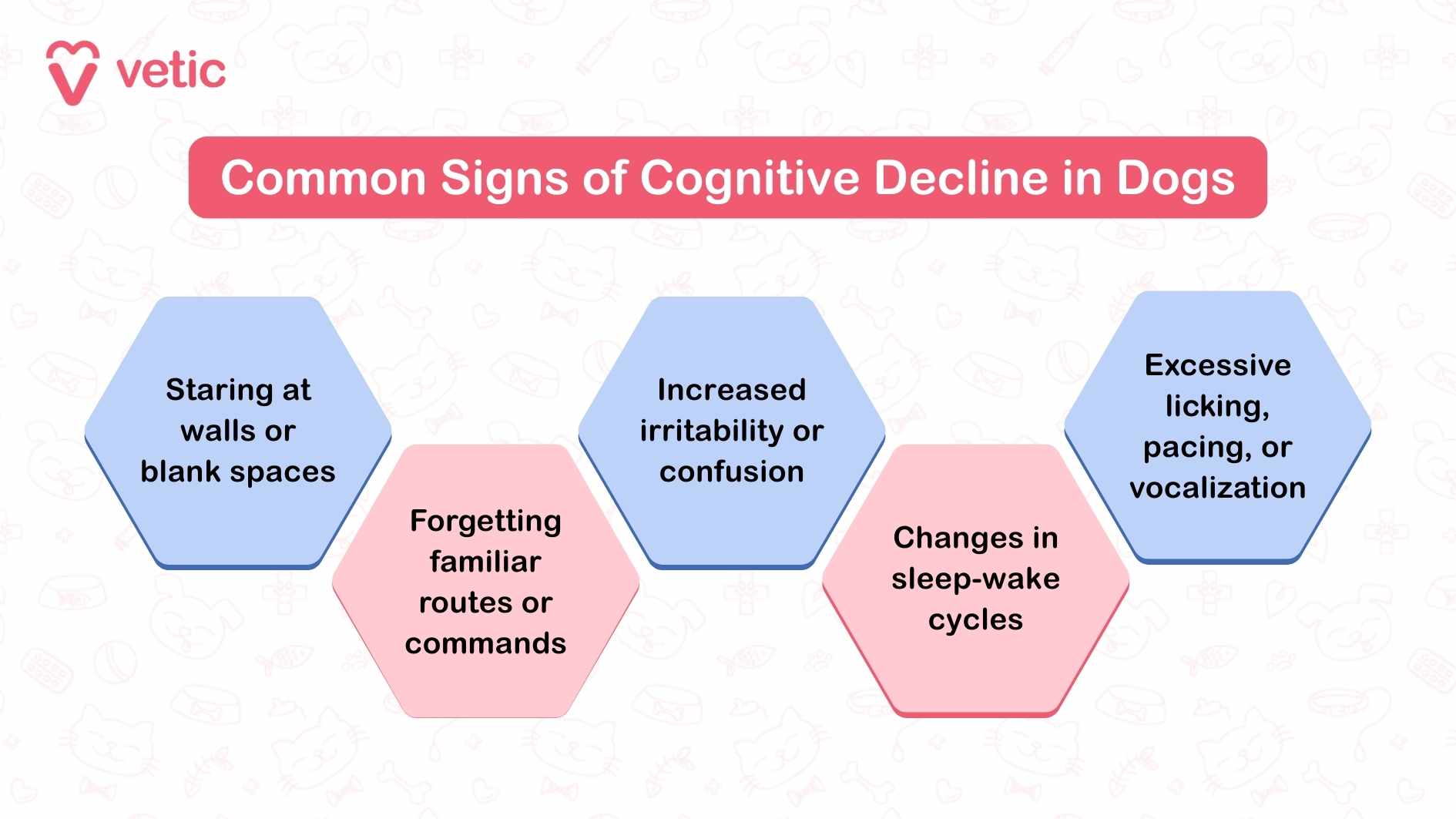
Here’s everything you need to know about cognitive dysfunction syndrome (CDS) in dogs. According to our expert veterinarians, the behaviours that can signify dog dementia can be represented by DISHAA (an acronym). It can help pet parents distinguish the normal signs of ageing from the signs of cognitive decline in dogs.
The signs of cognitive decline in dogs include –
- Disorientation
- Altered Interactions with their environment
- Disturbed Sleep-wake cycles
- Accidental House soiling
- Altered Activity levels
- Increased Anxiety
Let’s elaborate a little on the signs of dementia in dogs based on the DISHAA tool
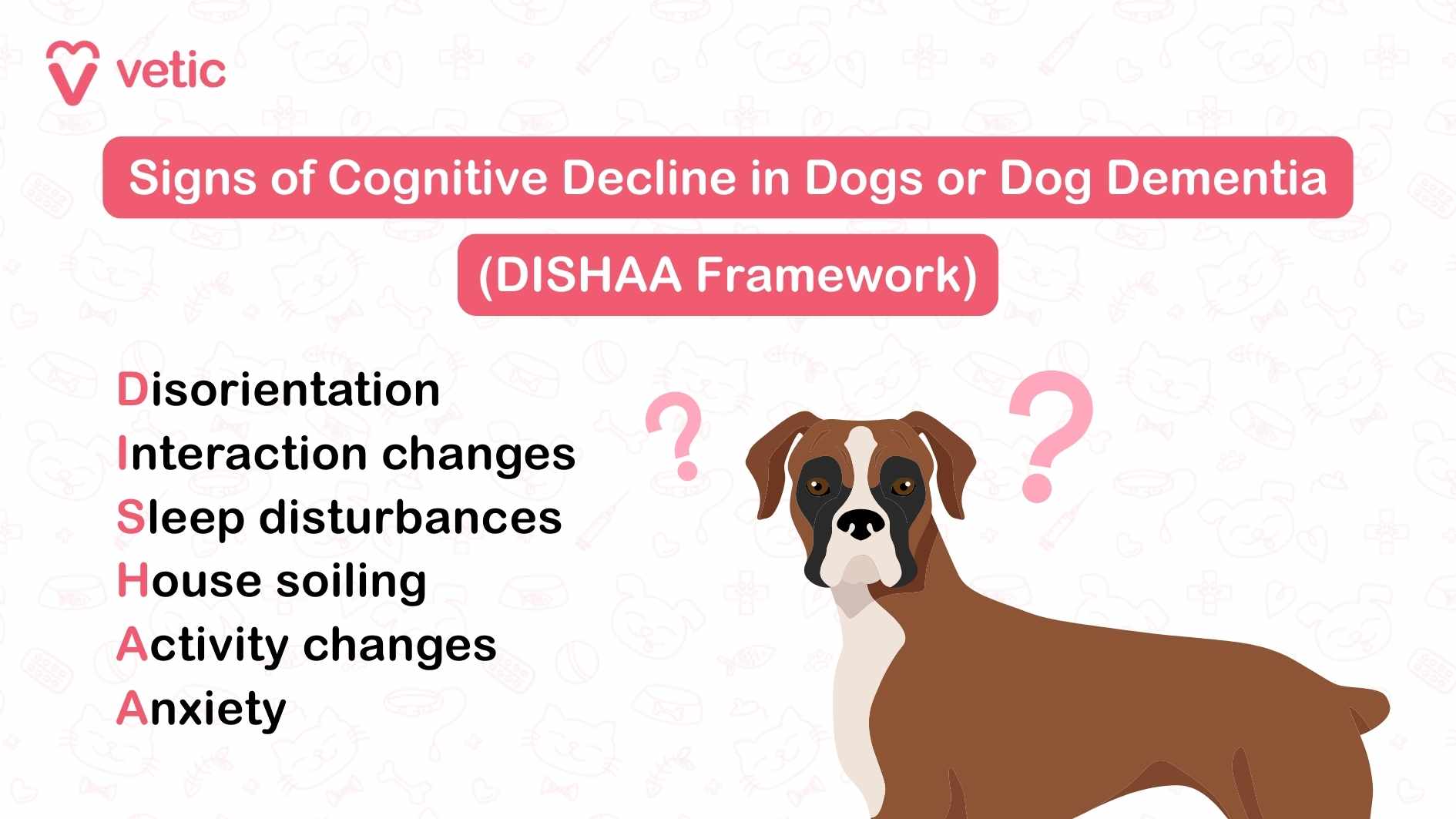
The most common signs of dementia in dogs include –
Disorientation or confusion
- Not able to recognise family, friends and other pets
- Staring at walls or other objects blankly
- Pacing around the house
Altered behaviour
- Extreme lethargy, no self-grooming
- Excessive licking and scratching
- Loss of appetite
- Increased irritability
Anxiety and memory problems
- Increased restlessness
- Not able to understand commands
- Accidental urination and defecation indoors
- Forgetting familiar routes
Changes in sleep-wake cycle
- Vocalization at night
- Excessive pacing at night
- Inability to fall asleep
In most cases of cognitive decline in dogs, more than one of these signs are visible. If you have noticed one or more of the above-mentioned signs in your senior dog, talk to your veterinarian immediately.
Diagnosis of Cognitive Decline or Dementia in Dogs
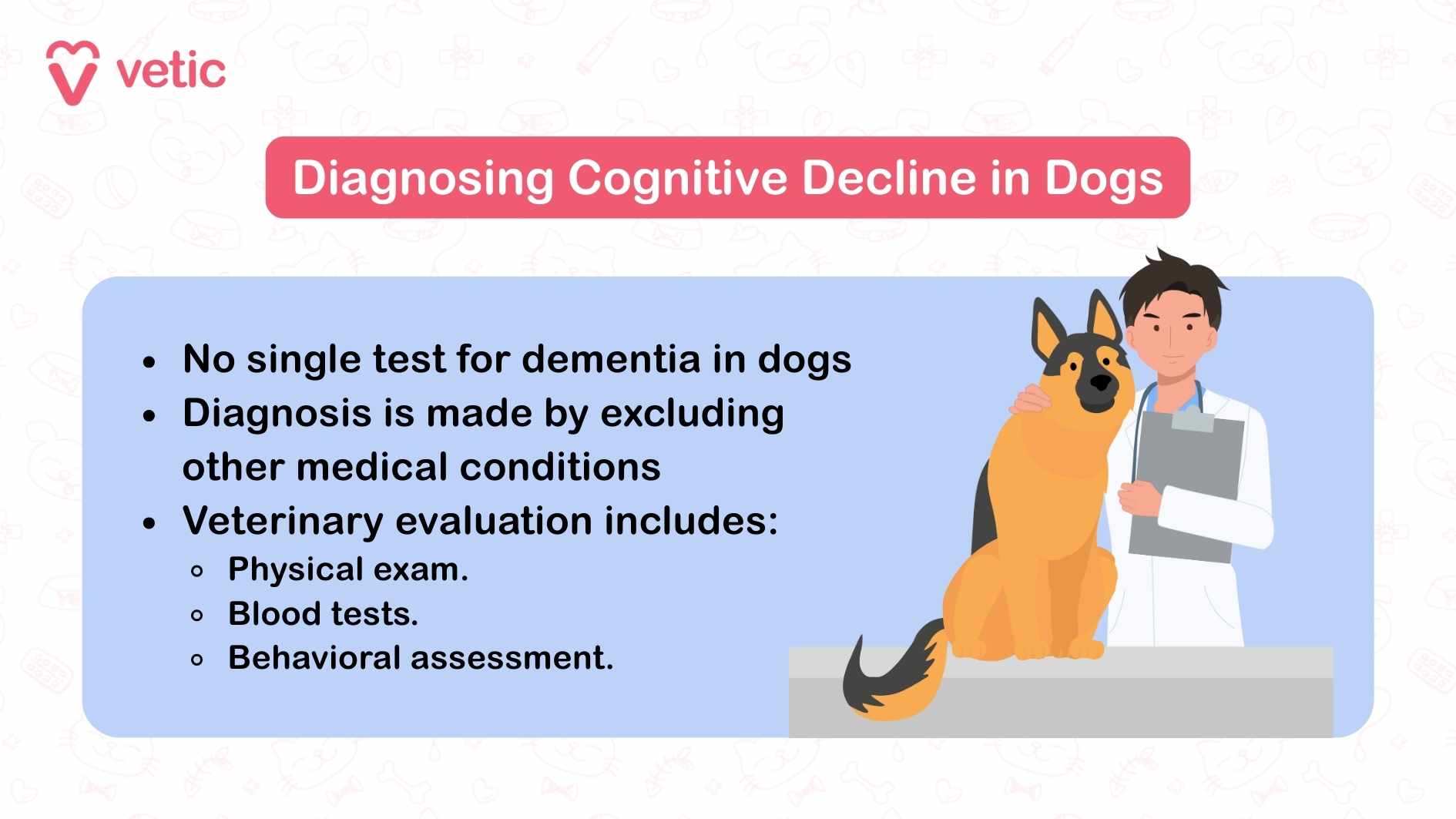
The diagnosis of cognitive decline or cognitive dysfunction syndrome (CDS) is a diagnosis of exclusion. Right now, we do not have a tool or test that exclusively diagnoses cognitive dysfunction in dogs.
At any point if you feel your elderly dog’s personality or behaviour has changed drastically, you should contact your regular veterinarian. Your senior pupper will need a complete physical examination with blood tests to rule out any physical discomfort that may contribute to any changes in their behaviour.
Once other health issues have been ruled out, only then CDS is suspected.
What are the Causes of Dog Dementia or Cognitive Decline in Dogs?
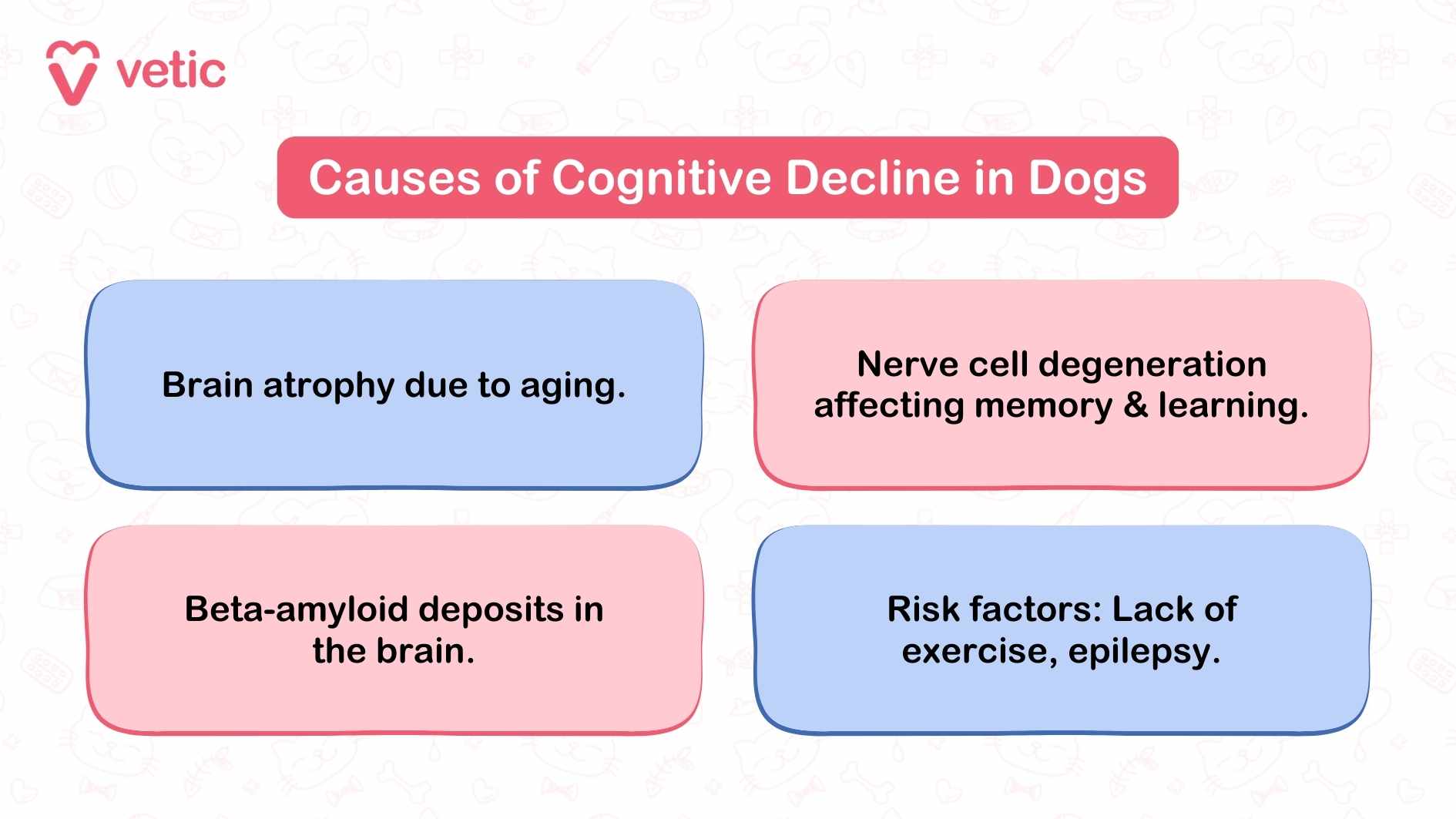
The exact causes of canine dementia or cognitive decline in dogs is not well understood. However, researchers have noted similarities between cognitive decline in dogs and Alzheimer’s in people.
With age, the brain loses its plasticity and begins to atrophy. The neural cells die and this specifically affects the parts of the brain responsible for learning, memory and coordination.
Studies have shown that dogs with cognitive decline have beta-amyloid deposits in their brains. It is strikingly similar to the deposit of beta-amyloid, an abnormal protein found in the brain of Alzheimer’s patients.
Recent research suggests that dogs with epilepsy and dogs who don’t get enough exercise are at higher risk for canine cognitive decline or dog dementia.
My Dog Has Cognitive Decline or Dementia. What’s Next?
Our veterinarians recommend physical activities and mental stimulation for all senior dogs irrespective of whether they are showing signs of cognitive decline or not. A few simple exercises for about an hour per day can give your dog a reward and high-quality life.
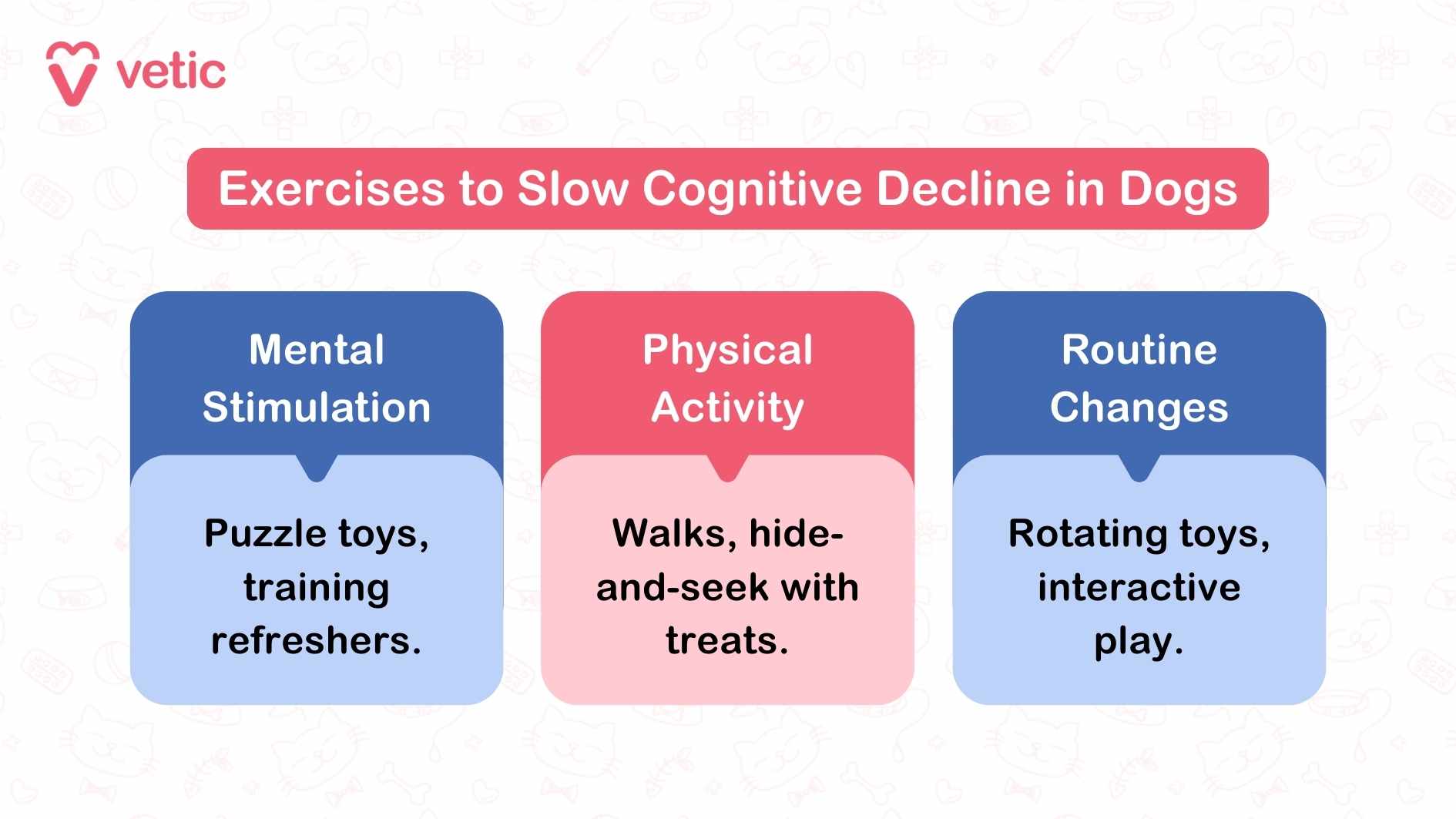
The intensity of these exercises will depend on the physical health and age of your dog.
Some of the most common exercises to prevent cognitive decline in dogs or slow its progress include –
- Refresher training and positive reinforcement training with your dog
- Playing games that stimulate their thinking – hide-and-seek with treats
- Providing them with puzzle toys (under supervision)
- Rotating their daily toys
- Regular walking and jogging (again, depends on their health and age)
Can Diet Help with Cognitive Decline in Dogs or Dementia?

Diet and nutrition do play an important role in preventing as well as managing cognitive decline in senior dogs.
Studies show that combining physical and mental activity with a high antioxidant diet can lead to better outcomes in terms of canine cognition and memory. However, there is no study on the restoration of memory or cognitive function in the cases of dementia or cognitive decline in dogs, just like there’s none in the field of Alzheimer’s in human beings.
You should always consult your veterinarian to find the diet that works best for your senior dog. Several brands have introduced high quality food for senior dogs. However, before changing your dog’s food completely, you should speak with your veterinarian. Since dogs experiencing cognitive decline may not be welcome to sudden changes in their diet.
Treating Dog Dementia or Cognitive Decline in Dogs
Caring for a dog with cognitive dysfunction syndrome (CCD) or dog dementia requires a compassionate and proactive approach. While there is no cure, pet parents can take meaningful steps to slow cognitive decline and enhance their dog’s quality of life.
A structured routine and an enriched environment are key to supporting a senior dog’s brain function. This includes:
- Consistent daily schedules for meals, walks, and playtime to reduce confusion.
- Interactive toys and puzzle feeders to encourage problem-solving and keep the brain active.
- Gentle exercise such as short walks or low-impact play to support circulation and brain health.
Making the Home Senior-Dog-Friendly
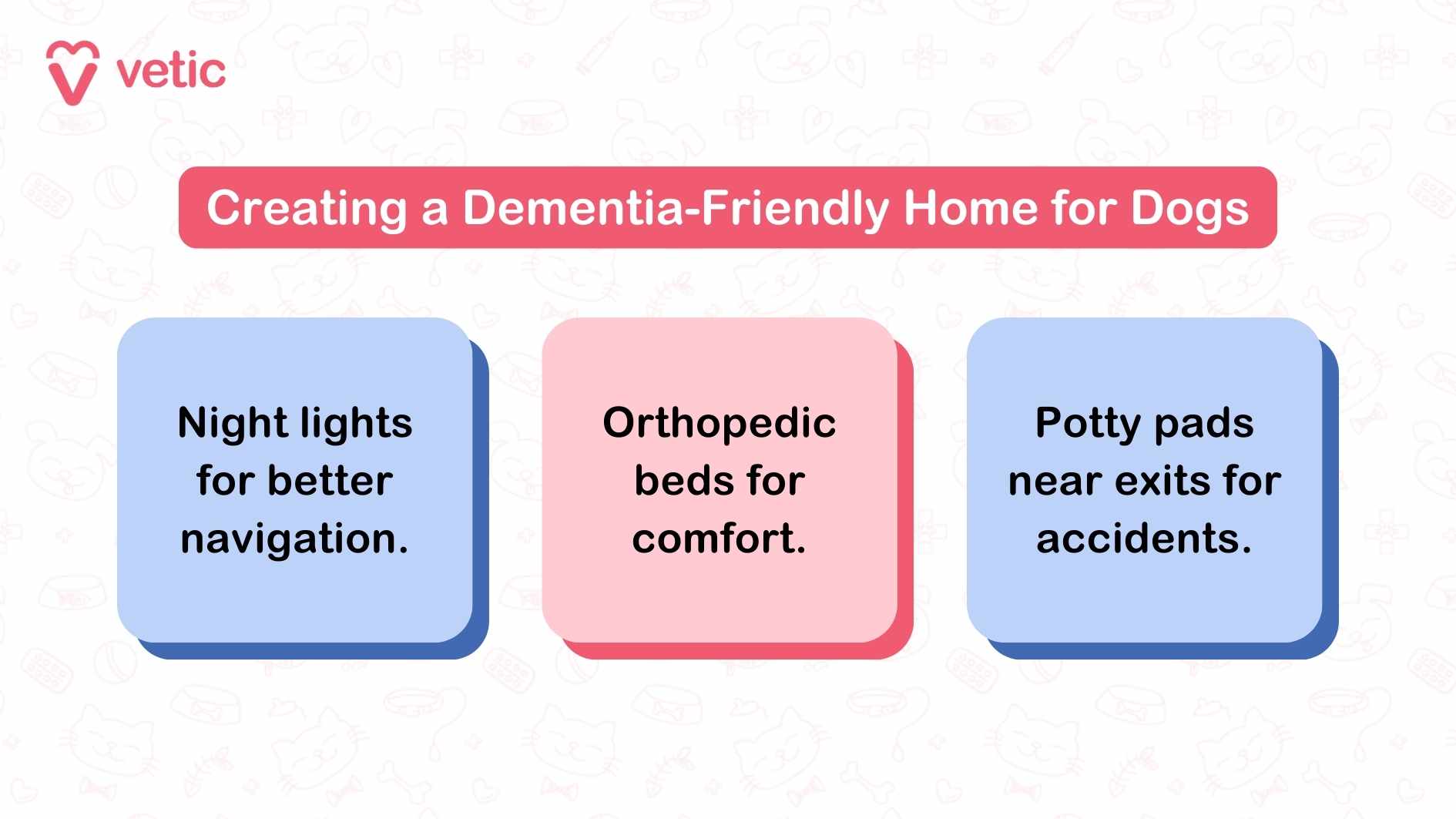
As dogs age, simple modifications can improve their comfort and independence:
- Night lights to help them navigate in dim lighting.
- Potty pads near doors for dogs struggling with bladder control.
- Orthopedic foam beds to ease joint pain and promote restful sleep.
Medical & Nutritional Support
Veterinary intervention plays a crucial role in managing CCD. Your veterinarian may recommend medicines and supplements for your dog:
- Medications to help improve brain function and manage anxiety.
- Omega-3 fatty acids & antioxidants to support cognitive health.
- Supplements like melatonin or SAM-e to enhance brain activity and regulate sleep.
A balanced senior diet rich in vitamins B, C, and E, selenium, and flavonoids to promote brain cell protection.
Regular Veterinary Monitoring
Because CCD is progressive, regular check-ups (at least twice a year) are essential to assess treatment effectiveness and adjust care as needed. If you notice new or worsening symptoms, inform your veterinarian promptly.
Cognitive decline in dogs can be challenging, but with the right care, your senior companion can continue to live a fulfilling and comfortable life.
Caring for your dog with cognitive decline or dementia
You need to provide your dog with a combination of behavioural enrichment, physical exercise and diet to give them a fulfilling and happy life. It is challenging but not impossible to provide your dog with a high quality of life even after their cognitive decline has begun.
Take time to keep them active and engaged. Keep them well-fed. Give them mental tasks to complete each day. These are a few simple ways to enrich the lives of your senior pupper.
There are a few supplements and medicines that can slow the progression of cognitive decline in dogs. Feel free to ask your vet if that’s advisable for your dog based on their medical history and current health.

